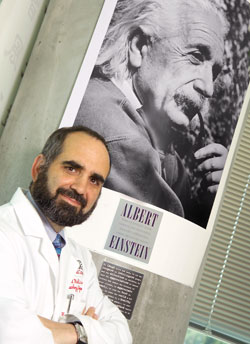 |
Howard Gendelman, M.D. |
NOTE: This profile is part of a series highlighting the 26 researchers who were named UNMC Distinguished Scientists or New Investigators for 2007. Each of these researchers will be profiled in UNMC Today leading up to a March 20 ceremony to recognize their achievements.
- Name: Howard Gendelman, M.D.
- Title: Professor and chairman
- Joined UNMC: 1993
- Hometown: Philadelphia
Briefly describe your research in laymen terms, please.
We seek ways to harness the body’s own immune defense to exact repair of neural injury in a wide spectrum of neurodegenerative and infectious disorders. This can be achieved through drugs, vaccines or stimulating the body’s own endogenous disease fighting processes. The overarching idea is that damaged nerve cells can undergo regeneration or repair under the proper set of circumstances.
What led you to pursue this area of research?
I was aways inquisitive and since a very early age building model rockets and digital robots. When my peers decided to pursue fellowships in medical subspecialties, I decided to go a different route and become a scientist. M.D., Ph.D.s were quite rare at that time. Thus, I did two back to back research fellowships three years each at the Johns Hopkins Medical Institutions and the National Institutes of Health rather than develop a straight track clinical career. There I learned the difference between physicians who pursue science and scientists that happen to also be physicians. The work that I still pursue today on immune aspects of the brain began 26 years ago when I was a postdoctoral student in neuroimmunology and neurovirology at Hopkins.
How do you see your research contributing to science?
My research has had a fundamental impact on how both scientists and physicians see the role played by the immune system for brain health and disease. We hope that in the not so distant future, the directives developed in brain repair can be used successfully to better exact positive outcomes in disease and lead to improved quality of life for those with infectious and degenerative diseases of the nervous system.
Why did you become a scientist?
Straight medical practice was not enough to keep the fires burning inside of me. I wanted to do even more. I wanted very much to be an explorer and when I was faced with the question of whether I wanted to read or write the literature, I chose writing it.
What is your hope for the next generation of scientists?
Opportunity! To be only limited by the scope and breadth of your dreams. As Walt Disney said, “If you can dream it you can do it.”
Beyond grant funding, how do you measure success?
I have never measured success by grant funding as this is a means to one end. Success is when someone asks, “Well, how was your day?” You simply turn around and smile.
What would you tell a student interested in a research career?
Our job as mentors is never to tell students anything but rather to help them in achieving their own dreams by removing obstacles and through guidance, understanding and, sometimes, tough love.
Do you have a hero/role model? If so, what do you admire most about them?
I am a spiritual man and admire many biblical characters, one of which is Abraham. My admiration surrounds his intense compassion of his fellow man. That is what we all work to achieve as physicians and scientists.
Tell us about your family and/or hobbies outside of the lab.
I enjoy playing the accordian, writing poetry and composing music.
List some things few people know about you.
Failure, the word “no” and moving on are never viable options.